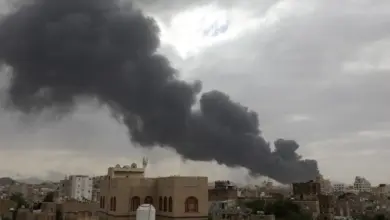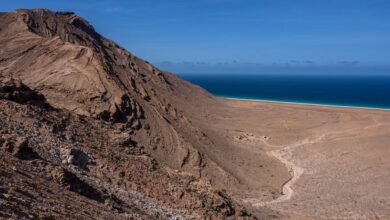An Al-Qaeda group tightened its grip on a Yemeni coastal town while in the capital Sanaa a truce was holding on Sunday between President Ali Abdullah Saleh's forces and armed rebels, hours after it was agreed.
Armed men believed to be from Al-Qaeda appeared to have full control of the coastal city of Zinjibar in the flashpoint province of Abyan.
"About 300 Islamic militants and Al-Qaeda men came into Zinjibar and took over everything on Friday," a resident said. The army had withdrawn from Zinjibar after a battle with militants in March, but later regained control.
Opposition groups have accused Saleh of using the Al-Qaeda threat to win aid from regional powers seeking his government's help in battling the militants. The groups have said they could do a better job of containing Al-Qaeda than the president.
In Sanaa, pedestrians and cars returned to streets where pitched battles during nearly a week of fighting killed at least 115 people.
The violence heightened fears that the country perched beside a vital oil shipping lane might descend into civil war.
The latest violence, pitting Saleh's forces against members of the powerful Hashed tribe led by Sadeq al-Ahmar, was the bloodiest since pro-democracy unrest erupted in January and was sparked by Saleh's refusal to sign a power transfer deal.
The ceasefire deal included a withdrawal of armed tribesmen from government buildings and moves to normalize life in the Hasaba district of Sanaa, where fighting with machineguns, rocket-propelled grenades and mortars prompted thousands of residents to flee the city.
"It's calm now. There were a few gunshots fired now and then, but nothing that heavy," said Salah Naser, a government employee who lives in the area.
Despite the truce, analysts are concerned fighting could flare again, given the animosity between the groups and growing popular anger at Saleh for not ending his nearly 33-year-long rule which has brought Yemen to the brink of financial ruin.
The truce extends to areas outside of Sanaa where tribesmen have clashed with the president's Republican Guards and air force fighters have strafed armed tribesman with bombs.
The crisis has cost the economy as much as $5 billion and immediate aid is needed to prevent a meltdown in a country with a nominal GDP of $31 billion, Yemen's trade minister told Reuters on Saturday.
TRIBAL RIVALRIES
There is growing concern that the Yemen-based Al-Qaeda in the Arabian Peninsula (AQAP) will exploit instability to build on its proven talent for daring bombing plots, analysts said.
The US and Saudi Arabia, both targets of foiled attacks by the AQAP, are worried that growing chaos could embolden the militant group.
The US is also concerned that tribal rivalries are complicating efforts to reach a power transfer deal and believes Al-Qaeda is trying to exploit instability there, senior US officials said on Saturday.
"Tribal as well as extremist elements are attempting to exploit the current instability in order to advance their own parochial interests," one official said.
International negotiators have become exasperated with Saleh, saying he repeatedly has imposed new conditions each time a Gulf-led transition agreement was due for signing, most recently demanding a public signing ceremony.
Nearly 300 people have died over the past few months as the president has tried to stop pro-reform protests by force.
But global powers have little leverage on events in Yemen, where tribal allegiances are the most powerful element in a volatile social fabric and the fighting already appears to be playing out along tribal, quasi-feudal lines.
Also in southern Yemen, three French aid workers went missing and a local security official said on Saturday they were believed to have been abducted.
Western tourists or workers often are kidnapping targets for disgruntled tribes seeking ransom or concessions from the government, but most hostages have been freed unharmed.



